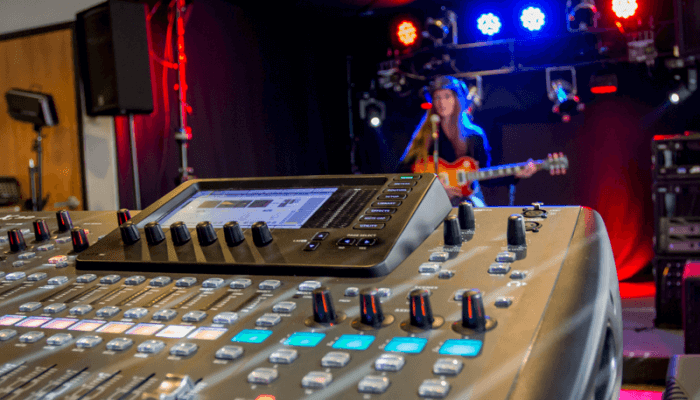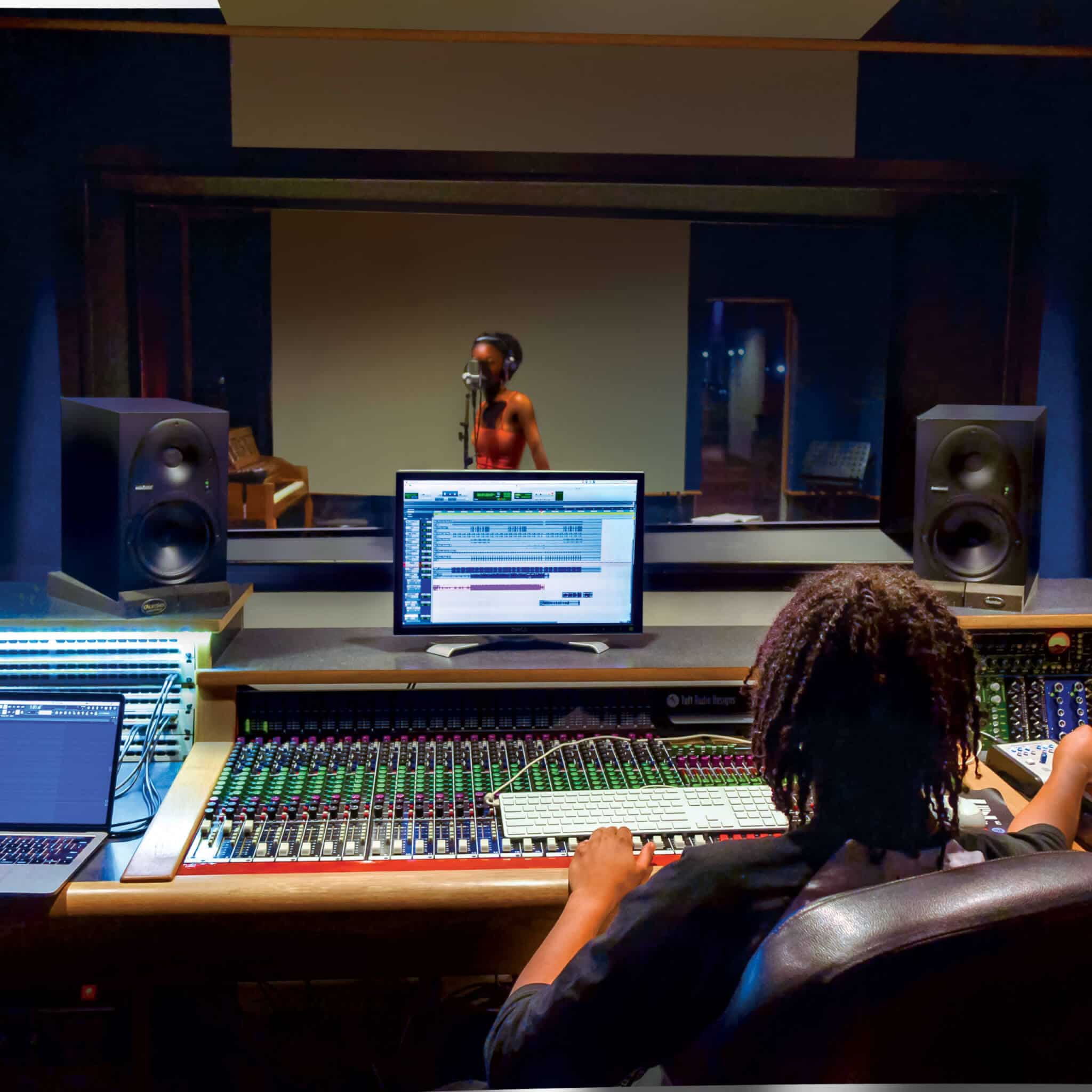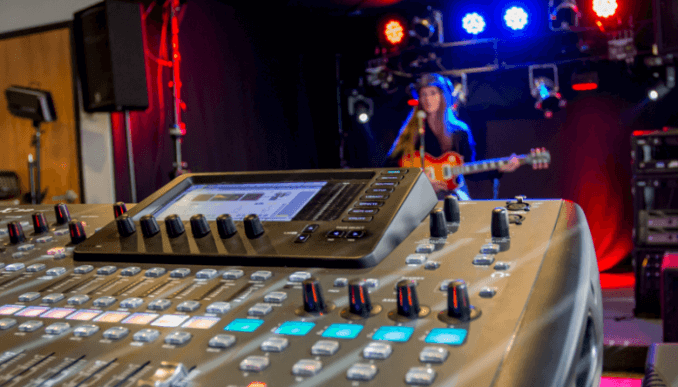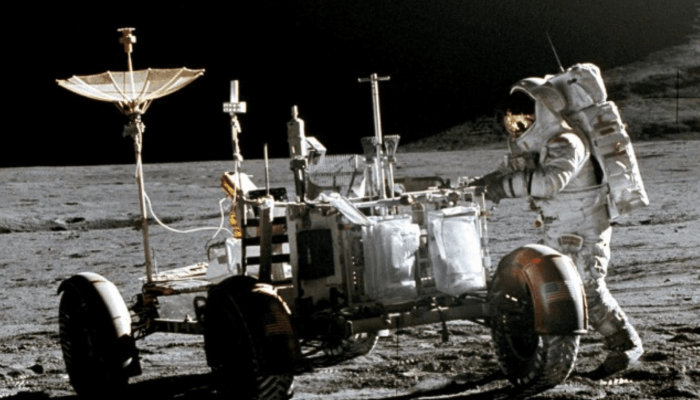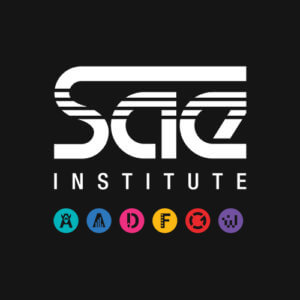
Kevin is a Career Services Advisor at the SAE Institute Nashville, pursuing a master’s degree in a field he pioneered: astro-musicology. Kevin is also a contributor to NASA’s Apollo Flight Journal, a living document that details every element of the eleven manned Apollo missions from the Earth to the moon.
I had the opportunity to sit down and chat with Kevin about his start in audio restoration, his work on the Apollo Flight Journal, and the link between space exploration and music.
In this piece you’ll learn:
- How RX helped forge a bond between Kevin’s career in audio and his lifelong passion for space exploration
- The long and storied connection between music and space exploration
Come on a journey through time and space, as we uncover secrets of the Apollo missions, plus powerful noise reduction and audio editing tools in RX.
Getting acquainted with RX and NASA
Kevin’s journey into the world of audio and engineering began, like so many before him, as a musician. Growing up a guitarist, it started simply enough playing in bands around his hometown. Before long though, he found himself recording his own music, then the music of his friends’ bands, and eventually pursuing a degree in audio engineering.
Eventually, this led Kevin to his current position at the SAE Institute, and it was there, in late 2017, that he ultimately crossed paths with iZotope’s RX audio repair software. When an instructor from iZotope came to teach a seminar on RX, Kevin attended along with the students, and the implicit possibilities began to dawn on him.
“It was really intriguing to me… It kind of stuck in the back of my mind like, ‘this is extremely useful—this is so powerful that this could really be a game-changer for a lot of people…’ At first, it was things like cleaning up 60-cycle noise on guitar recordings and things like that, but I realized that this toolset can have so many other implications that can actually help things that actually matter.”
Around 2010, NASA released thousands of hours of audio recordings from the Apollo missions to the public. While this flew under the radar of many audio engineers, Kevin, a self-proclaimed space-history nerd, relished the opportunity to delve in and listen for any new nuggets from the archive.
It’s these recordings that form the basis of the Apollo Flight Journal (AFJ), and as he listened through them, Kevin began to connect some dots. He noticed that while many of the radio communications and dialogue were documented in the journal, music playing in the background was often left uncredited. In a way though, this was unsurprising: the recordings were frequently so poor that identifying the music was nearly impossible.
Where others heard garbled recordings though, Kevin saw an opportunity. He put RX to work, and before long was submitting unique contributions to the AFJ. Of working with the AFJ team, Kevin explains:
“They’re happy to have people that, first of all, care about what they’re doing, care about the history, but also those that have a specialty that’s a little bit outside of their own… You know, they’re brilliant astrophysicists, they’re historians, but they’re not musicians… They’re not audio engineers.”
At first, Kevin’s work was all voluntary. He would find interesting snippets, clean them up, submit them to the AFJ team, and slowly his credits in the journal grew. Then one day, NASA called him.
Putting RX to work
During the Apollo 15 mission, there was a radio transmission that occurred between the command module and the lunar module, and NASA was trying to clear up one particular element of it. Kevin paints the picture for us.
“So here’s the scenario: the command module is orbiting the moon, and as the lunar module is ascending, the command module plays some music to them to commemorate the moment. Now, this was so garbled you could not make it out. You could understand it was music but that was about it.”
Kevin got to work with RX, and in minutes he had a result. Not only was he able to identify the song, he was able to get a SoundHound hit and identify the specific recording. As for how quickly he was able to get results, the answer is simple.
“The Repair Assistant is always where I begin and it’s very intuitive. It’s a great starting point and will very often be the very thing that I need.”
In the case of the Apollo 15 recording, the Repair Assistant was as far as Kevin had to go, and inspired by his results, I decided to see how much further I could take it. Like Kevin, I started with the Repair Assistant, tweaking its chosen settings slightly to quickly sort out the noise and hum. From there, I used a couple targeted instances of De-crackle, did some De-clicking, attenuated some of the harsher distortion with Spectral Repair, and balanced the overall EQ a bit.
What Kevin quickly discovered was that the recording in question was the U.S. Air Force Song (“Off We Go”), from a 1958 recording, conducted by Felix Slatkin. From a historical perspective, this made perfect sense: all three crew members of Apollo 15 had served in the Air Force, so to play this particular song as the lunar module was ascending from the surface of the moon, back to the command module in orbit, was a fitting tribute.
Interestingly, perhaps the reason that this song avoided detection for so long was because it wasn’t exactly sanctioned by ground control.
“The other funny thing there was that in broadcasting the US Air Force song as they were ascending, they actually interrupted communications from ground control that they really needed to be getting. So they actually got reprimanded for it!”
The link between space exploration and music
For nearly as long as humans have been going into space, they’ve been bringing music with them. While on the surface that may seem odd to some, Kevin sums it up perfectly.
“Anywhere humans are, there’s going to be music. Music plays a very important role, way beyond just entertainment. Music is culture, and culture is who we are. It’s why we do the things we do, and how we do them. Culture is everything. Culture is the why. So where there are humans, there’s going to be music…
In the case of Apollo 11, the famed mission which first landed mankind on the moon, Neil Armstrong and Buzz Aldrin chose a broad selection of music to bring with them, both to listen to during their four-day journey to the Moon, but also to play during their moonwalk. Two of these songs stand out to Kevin, one for its ties to NASA, and the other because he was the first to correctly identify it.
The latter was chosen by Neil Armstrong, and was actually hinted at in the recent Damien Chazelle film, “First Man”.
“They mentioned this album, which is Music Out of The Moon by Les Baxter, and it’s actually a theremin album. I’m a theremin player, so I knew this album. So when I heard this, I knew exactly what it was.”
Over the years, this song has been incorrectly cited as “Lunar Rhapsody”, and “Moon Moods,” both off the Music Out of The Moon album. In fact though, the truth is much stranger. The song actually played by Armstrong was the last cut off the album, a song entitled “Radar Blues.” Little did he know how prophetic this would turn out to be.”
Later in the flight, as the lunar module descended through the 6,000 feet above the lunar surface, a series of alarms started to go off.
“The alarms that were going off as they were descending to the lunar surface—they had these [1201 and 1202] alarms that kept going off as they were descending—it turned out to be literally the radar overloading the computer. So they literally had the ‘Radar Blues’. [But] all these years, that actual song has been completely unknown to most people because most people are not listening to exotica theremin music like I am.”
The other song which stood out to Kevin was one chosen by Buzz Aldrin. Definitely something of a deep-cut, Kevin describes it as sounding like “a Johnny Cash song that you’ve never heard before.” In actual fact, the song is “Mother Country” by John Stewart of Kingston Trio fame.
During the early years of the space program, NASA had used music to try to help popularize the idea of traveling to space (more on that in a minute). Interestingly, John Stewart had been involved in this campaign. Whether or not that played a role in Aldrin’s choice to include “Mother Country” on his lunar mixtape we may never know, but the possibility is certainly intriguing.
Fast-forward to today, and this trend has come full circle. NASA’s Artemis program is aiming to land the first woman and next man on the Moon by 2024, but this time, they’re reaching out to the public to curate the soundtrack.
“Part of the outreach is this thing called #NASAMoonTunes, which is a way that they’re using to drum up more support from the public. You can submit music that you would like to be part of their soundtrack going back to the moon,” Kevin explains.
The evolution of “space music”
Just as NASA used music to influence the public’s opinion of space exploration, so too space exploration ultimately influenced musical artists back on the ground. To a certain extent, these two elements played together in a positive feedback loop, helping push one another forward. Speaking of the genesis of this pattern, Kevin explains:
“For a long period of time, space actually represented “the future.” Until the information age, space was “it,” it was how you thought of the future and because of that, there had to be a musical accompaniment to it.”
Initially this mostly took the form of early electronic and exotica music. Everything from movie soundtracks—think the 1951 version of The Day The Earth Stood Still—to the space-age bachelor pad type sounds of Esquivel and Les Baxter started to draw inspiration from the futurism of the space race.
This even had a parallel in the Soviet Union. If you’re curious, check out the music of Vyacheslav Mescherin for some Soviet space-age easy listening. While much of his music was initially outlawed, it eventually became the unofficial music of the cosmonaut program.
By the early ’60s, the space-age music craze was even making its way into rock, and more specifically, surf music. One of the earliest examples of this is “Telstar” by The Tornadoes. Written and arranged by Joe Meek, it was named after the early communications satellite (still in orbit to this day, although long defunct), and became a template for much surf of the music to follow.
“This is in the age of bands like The Ventures and The Shadows; all these instrumental hits that didn’t have a language barrier. This stuff became very influential in that time period between the death of Buddy Holly and the Beatles coming out, during that age of surf music and such.
We have lots of classic albums even, like Ventures in Space [by The Ventures], Out of Limits! by The Marketts, and all these great, space-themed surf music connections. So by the time you get to modern-day—like the soundtrack for something like First Man or Apollo 11—it sort of comes full circle. You really get all of these influences coming together into one really matured, new style of music.”
Concluding thoughts
As a mastering engineer, I’m constantly working on new music. Not only that, but I get to be the first person to hear a song or album in its finished state, and in a way that often feels like I’m discovering it for the first time. That, to me, is just incredibly, unbeatably cool.
For Kevin, it was an addiction to that same element of discovery that fueled his passion for digging through the countless hours of Apollo Flight Journal recordings. He admits that much of it is mind-numbingly boring, but every so often, while poring over 50-year old recordings, made hundreds of thousands of miles from Earth, something special happens.
“When you have these moments that kind of correlate all together—you know, I’m a theremin player and I hear a theremin song in the background and I recognize it, and I see that nobody’s ever bothered to come up with the song title—it’s absolutely huge. And yeah, you have this sense that you’re on the cusp of something huge.”
As his collection of these moments grew and grew, Kevin decided to turn them into his masters project via a documentary he’s working on and calling, “Songs of Apollo.” He’s already put together three episodes in collaboration with the Nashville Adventure Science Center, and if you’re interested you can follow his progress at www.songsofapollo.com.
While the details of Kevin’s journey are certainly fascinating, what our conversation impressed most upon me was what can happen when experience meets opportunity. When the moment arose and a new tool popped onto his radar, his lifelong fascination with space exploration, coupled with a deep knowledge of the music of that era, poised him perfectly to make his mark on history.
This reminds me just how crucial it is to always stay passionate and never stop exploring. Keep a lookout for new doors to open and new roads to follow. You never know where they may lead you.
*Article courtesy of iZotope by Ian Stewart. You can find the whole article here.





